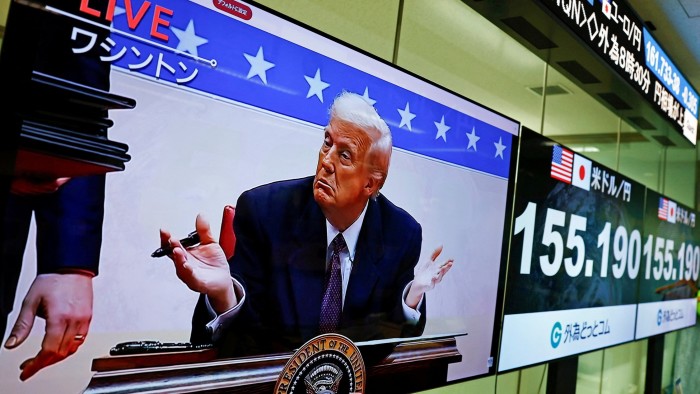Unlock the White House Watch newsletter for free
Your guide to what the 2024 US election means for Washington and the world
Donald Trump sparked a fresh sell-off in exporter currencies as he threatened to hit Mexico, Canada and the EU with tariffs.
Speaking in the Oval Office late on Monday, Trump said he could enact tariffs of 25 per cent against both Mexico and Canada as soon as February 1, repeating earlier threats to strike two of the US’s closest trading partners with levies to retaliate for weak border security and fentanyl trafficking.
Trump’s renewed warnings sent the peso down 1.1 per cent and the Canadian dollar 1 per cent lower against the US dollar on Tuesday.
Both currencies had gained sharply the previous day after administration officials said Trump would refrain from immediately imposing levies on key partners and instead study the trade situation.
In a sign of how Trump intends to use trade curbs as a key diplomatic tool, the new president also hit out at the EU, threatening the bloc with tariffs if it did not buy more US oil.
“They don’t take our cars, they don’t take our farm product, they don’t take almost anything,” said Trump. “And yet, we take their cars and we take their farm product, we take a lot from them. So we’ll figure that out with either tariffs or they have to buy our oil.”
The euro fell 0.6 per cent against the greenback to $1.035, partially reversing a 1 per cent gain on Monday.
Sterling fell 0.7 per cent to $1.224 after a 0.8 per cent rise the previous day.
“It is still highly likely that considerable tariff actions are coming but in what way and exactly when remain unclear,” said Derek Halpenny, head of markets research at MUFG.
The price swings highlight how investors are preparing for upheaval this week, especially in currency markets, as Trump rolls out plans to unwind many of Joe Biden’s hallmark policies and enact a protectionist agenda that weaponises America’s economic heft.
“This sort of volatility is the new normal,” said Eric Winograd, an economist at AllianceBernstein. “Policy under the Trump administration is likely to be less predictable and less process-oriented than what we have become accustomed to under the Biden administration.”
Futures tracking Wall Street’s S&P 500 and Nasdaq 100 indices both pointed to opening up 0.4 per cent. Both markets were closed for a US public holiday on Monday.
The FTSE 100 was flat in afternoon trading, while the Dax was down 0.1 per cent. The broad-based Europe Stoxx 600 was flat.
Wind companies fell after the Trump administration said it would halt permitting and leasing of new wind projects. Ørsted, the world’s largest offshore wind developer, which also announced fresh writedowns on its US business, tumbled 13.4 per cent. Danish turbine makers Vestas fell 2.4 per cent, while German Nordex was down 1.6 per cent.
Bitcoin, which briefly hit a new intraday high of $109,241 on inauguration day, subsequently reversed gains as the president made no mention of cryptocurrency policy in his inaugural address. Prices edged up 1.1 per cent to $103,661 per token on Tuesday.
In Asian markets, traders were relieved after Trump refrained from immediately enacting trade curbs against China, even as he warned he could do so if Beijing declined to hand the US partial control over the social media app TikTok.
The CSI 300 index of mainland-listed companies rose 0.1 per cent and Hong Kong’s Hang Seng gained 0.9 per cent.
The offshore renminbi also strengthened to a six-week high of Rmb7.25 to the dollar, before weakening to 7.29.
“The short version is we may have avoided the worst-case scenario from a risk-asset perspective. There were no day one tariffs on China,” said Jason Lui, head of Apac equity and derivative strategy at BNP Paribas.
“The Chinese equity market [already] rallied into the inauguration after the Trump-Xi phone call over the weekend, that’s why there’s a more measured reaction.”
Reporting by Adam Samson and Harriet Clarfelt in New York, Aime Williams in Washington, Arjun Neil Alim in Hong Kong, Leo Lewis in Tokyo, Nic Fildes in Sydney and Mari Novik and Ian Smith in London
